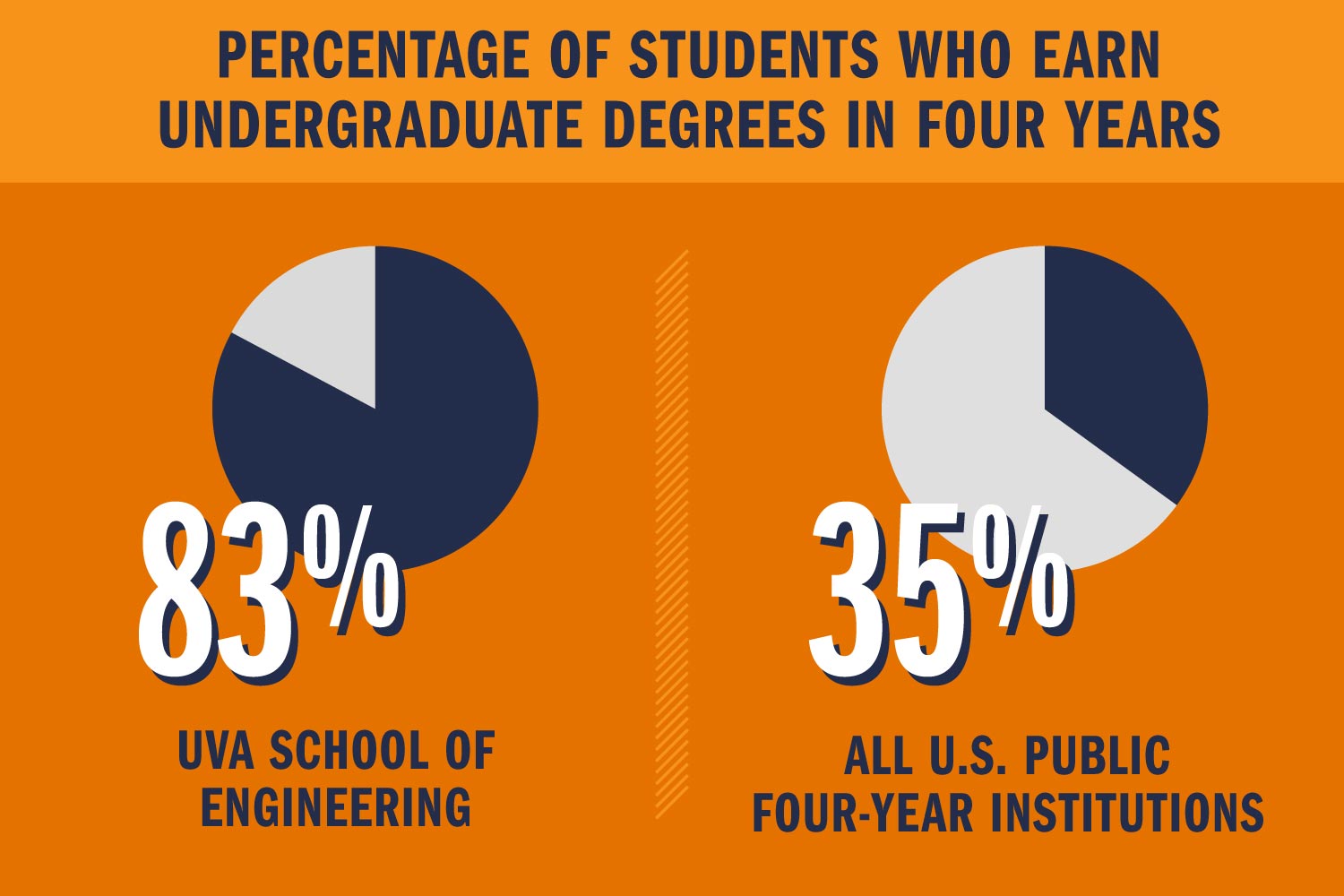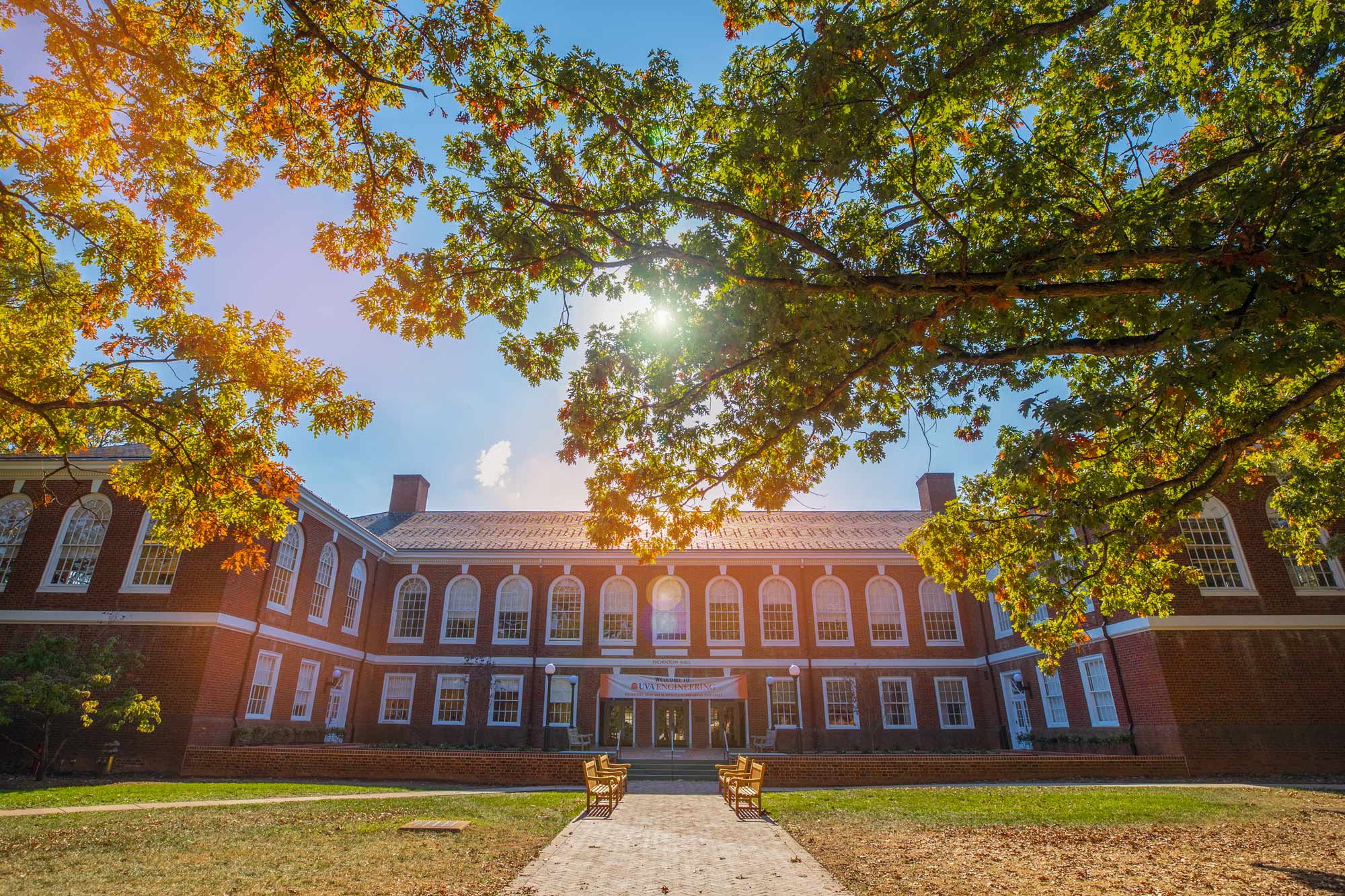As the University of Virginia School of Engineering and Applied Science sends its Class of 2018 off to careers and graduate school, it has received an affirmation that commencement is particularly meaningful: An analysis of U.S. four-year, public engineering school graduation rates shows that UVA produces the highest on-time graduation rate of undergraduate engineering students among peer institutions nationwide.
According to the American Society for Engineering Education’s “Retention and Time to Graduation Survey,” in which 81 U.S. public engineering schools participated, 83 percent of students who enrolled in UVA’s Engineering School in 2011 earned their undergraduate degrees in four years. Compare this with the national four-year graduation rate for all engineering schools that responded to the survey (111 public and private schools): 33 percent. And the national average on-time graduation rate for all public four-year institutions (not just engineering schools) is just 35 percent, according to the National Center for Education Statistics.
“The admissions process for UVA Engineering is extremely competitive, so we make a commitment to the students who work hard and earn admission that we’re going to do everything we can to help them succeed,” said professor Maite Brandt-Pearce, UVA Engineering’s executive associate dean for academic affairs. “We don’t believe in weed-out classes; we want everyone to make it.”
UVA Engineering’s graduation rate, as reported for the survey, does not include students who also graduate in four years, but have transferred to a non-engineering degree program within the University. For all students who started at UVA Engineering in 2011 and earned a bachelor’s degree from the University, the four-year graduation rate is 89 percent.
The ASEE survey also reveals that UVA Engineering offers the top graduation rate among surveyed public engineering schools for Hispanic, Asian, African-American and multi-racial students, and is in the top 10 percent for its graduation rate for women.
UVA’s graduation rates for the Class of 2018 cohort will become available after summer students earn their degrees, and the American Society for Engineering Education is preparing to release results of another survey in the near future.
“Our approach to the total life experience of students is what makes the biggest difference,” said Lisa Lampe, UVA Engineering’s director of undergraduate success, which is in the Engineering School's Office of Undergraduate Programs led by Associate Dean Lloyd Harriott. “We’re interested in developing students holistically, and we understand that non-academic issues can affect academic success. For example, students may have issues pop up with family, such as illness or death. We connect them with resources to ensure that they’re propped up on every side so they can focus on their learning and be successful.”

Lampe helps students with skills such as prioritizing their work, developing organizational skills, staying on top of homework and communicating effectively with faculty. “We just assume that they come to college and they’re ready to learn,” she said. “Sometimes they have to learn how to learn before they’re really successful.”
Students’ success at UVA Engineering starts immediately in their first year, when all entering prospective engineers receive advising through their mandatory “Introduction to Engineering” courses. In these courses, students are exposed to the skills and experiences they will need to succeed in the program – and, more broadly, they learn what it means to become an engineer in a society that desperately needs them to solve some of its biggest challenges.
“Our mission is to make the world a better place by preparing engineering leaders who will solve global challenges and contribute to a strong economy,” UVA Engineering Dean Craig H. Benson said. “We take this responsibility very seriously. I am proud of our collegial environment, which supports our students’ success.”
UVA Engineering is particularly conscious of the supports that students may need if they are entering from populations that are typically underrepresented in engineering, such as students who are the first in their families to attend college, women, African-Americans and Hispanics, Brandt-Pearce said. These future engineers are offered the opportunity to participate in a summer “bridge” program that includes orientations and sessions to gain critical academic skills.
“We want our students to be ready for their first semester,” Brandt-Pearce said. “We want to make them really feel welcome and that we are here to support them – and that they are not on their own.”
Once students choose their engineering majors in the spring of their first year at UVA, they are assigned to within-major advisers. An embedded career development team also “engages with students starting in their first year to help them design their curriculum and their future careers – and to think about their lives as something they are able to design,” Brandt-Pearce said.

“We also have a dedicated director of undergraduate success whose whole job is to take care of the students so that no one falls between the cracks.”
The University also has embedded an associate dean of students and a counseling and psychological services professional within the Engineering School to support students’ mental health, an increasingly important issue that institutions of higher education are grappling with across the country.
“We follow each student through the program, offering tutoring and mentoring to students who feel like they need extra help,” Brandt-Pearce said. “We also employ a great number of undergraduate teaching assistants who are very aware of what their peers’ struggles are – and proactively address how a student might misunderstand the material.
“I am tremendously proud of what our students have accomplished, and grateful to our faculty and staff for their commitment to our students’ success.”
Media Contact
Article Information
June 5, 2018
/content/uva-posts-nations-highest-four-year-public-engineering-school-grad-rate

